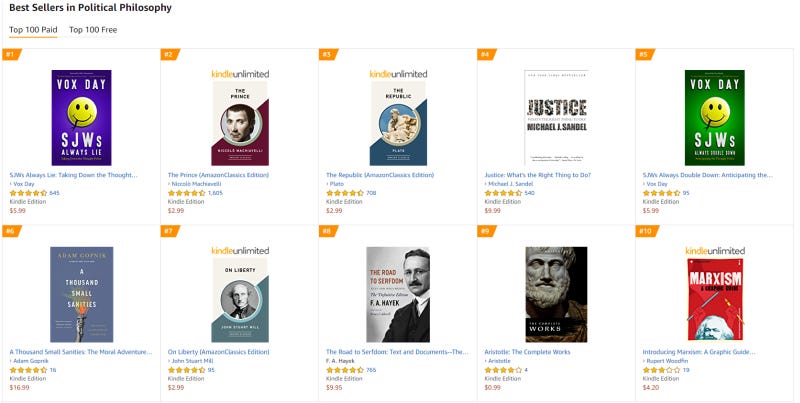Why Men Don't Read
It's not exactly a mystery
Penguin Random House introduced its nine new paid trainees. Do you notice anything about them?
In 2015, it was reported that women represent 78 percent of the publishing industry overall and 84 percent of the editors. Those numbers have almost certainly risen in the intervening decade, while men increasingly have stopped reading fiction, as the male fiction-reading rate declined from 35.1 percent in 2012 to 27.7 percent in 2022. Female authors also account for more than 50 percent of all books being published, in both the fiction and non-fiction markets.
Feminists consider these developments to be a success, despite the fact that the overall number of books sold in the USA has not increased concomitant with the 12 percent growth in the population. But they wonder why this success has not been replicated in other industries.
Women have seen incredible progress in book authorship but continue to lag in other creative realms. For example, while they have made inroads in recent years, women still accounted for less than 20 percent of movie directors and less than 10 percent of cinematographers in the top 250 films made in 2022. Likewise, when looking at the data on patents for new inventions, women make up only between 10 to 15 percent of inventors in the US in a typical year.
The answer is pretty simple. Unlike other industries, success in the publishing industry is mostly, though not quite entirely, given to an author rather than earned by her on her own merits. Every step of the publishing process, from book contract to literary award, is carefully curated by a very small group of people, mostly women, who control who is permitted to publish, what the print runs will be, what the bookstores will carry, and where the books will be displayed in on the shelves.
Even in the world of ebooks, which for a brief moment of time was entirely meritocratic, has been brought under control by Kindle Unlimited and the A9 algorithm that selects the monthly winners for Amazon. I hope you will appreciate that this is not an expression of sour grapes; the audiobook for A Throne of Bones was once designated a monthly winner by the Audible algorithm and sold more copies in those 30 days than it had in the rest of the decade since it was released.

This is why crowdfunding and direct sales to readers are so important. They are the only way that books written by men and intended for a male audience will continue to be published, particularly books of which the female publishing elite may not approve. Fortunately, the strong support for this site by men and women alike, and the similarly strong support for the forthcoming Sigma Game book, ensure that the vagaries and political shenanigans will have no effect on our ability to publish it and other works exploring and expanding the Socio-Sexual Hierarchy.
Hypergamouse is being printed and should arrive in the US warehouse within three weeks, from where it will be shipped out to the backers. My goal is to finalize the Sigma Game text by the end of April, and get it into the backers hands in the May-June time frame. In both cases, it has taken a while to finish them, but I’m confident that everyone will agree that the improvements and embellishments that were made possibly thereby were well worth the delay.
Of course, all this points to an obvious question. If women are doing the vast majority of the writing, publishing, and reading, precisely what are they writing, publishing, and reading. And the answer, it turns out, is low-quality ASCII porn.
While nonfiction retains its lead over fiction by a 3:2 ratio, 80% of all fiction novels are marketed and sold to women, and it’s clear that this slop constitutes a major reason why. It is worth considering that genre crypsis and obfuscation are occurring here; Young Adult, Romance, BookTok, and Sci-Fi/Fantasy basically exist on the same continuum and—just like regular porn—the less explicit stuff feeds into the harder stuff. A Court of Thorns and Roses might not feature explicit actual rape and BDSM, but the stuff that these women end up reading 8 months after probably will.
This points to the most frustrating aspect of discussion surrounding ACOTAR and its genre-sibling titles. There exists a rhetorical shell game that's played anytime this comes up. It's never called porn. It's “smut,” “spicy literature,” and “it's not the same, it’s reading.” They’re all euphemisms to soften the blow that they’re reading 416 pages of rape-adjacent sexual domination fantasy with baked in masturbatory hypergamy, monkey-branching, and sexual competition over women where men are described as “gorgeous” and “sensuous.
A Court of Thorns and Roses was originally published in 2015 by “fantasy” “author” Sarah J. Maas, and if your senses are tingling, check her wikipedia page, they're right (every time). Considered the most popular novel of the “Romantasy” genre (a portmanteau of romance and fantasy), ACOTAR has served as the gateway drug for many a woman who would later lust after Count Oorlock from Nosferatu (2024) as well as most of the denizens of “BookTok” (young women talking about these romance novels).
I would like to also take a moment to paint a picture of Sarah Maas's prose. Simply put, she writes like a middling fanfiction author. The chapters are extremely short, giving the impression of vignettes written in 3-5 day stints by a Literotica, AO3, Tumblr or Wattpad writer.
If this is victory for the fair sex, one shudders to imagine what defeat would look like.





The change in book stores has been striking in last years. Most of the books in more visible places are crap written by women. It´s not so fun to visit them anymore to maybe find something interesting by accident.
In Spain three male writers put up a book with fake female name front of "Carmen Mola", helped by their female agent. They had great commercial success, and won one of the most famous Spanish literary prizes "Premio Planeta" before their identity was uncovered. Was a minor scandal, but pseudonyms are not illegal, so they published several sequels.
I wonder how many men, such as myself, have simply turned to used books? 90% of the books I buy are from a local used book store or thrift books. When the family travels to town, it is the treat we give to the children, "We're going to _____" and screams of excitement follow from my children, who we're thrilled hold books so precious.
The only other books I really ever consider buying are the based books and stuff from Castalia. Why spend my money on junk and supporting people who hate me?